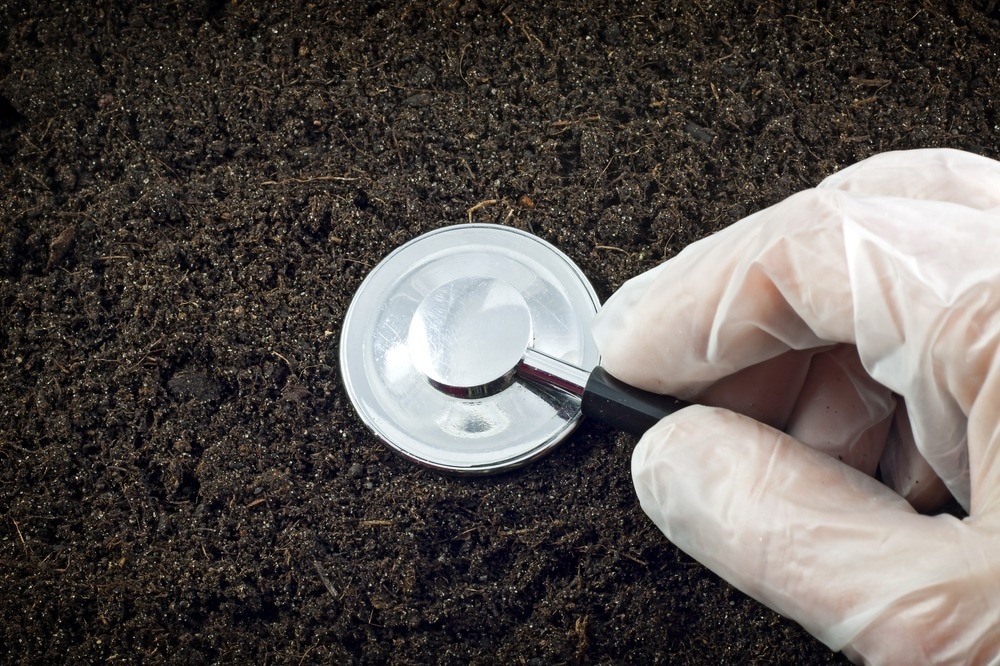Maximum crop yield has become the key focus of farming across the world. The world's population is growing, meaning we need more food to feed everyone. In addition, the challenges posed by climate change make it harder to achieve healthy, bountiful crop yields. As a result, the agricultural industry has become blinkered into focussing on maximizing crop yields, even if it means adopting unsustainable techniques that will harm crop production in the long term.

Image Credit: KarlosWest/Shutterstock.com
One of these unsustainable methods is the widespread use of chemical fertilizers. Such fertilizers harm the soil and limit the possibility of growing healthy crops in the future. Here, we discuss the agricultural industry's excess use of chemical fertilizer, how this impacts soil health, and what alternative options we have.
Excess fertilizer use and poor soil health
Over recent decades, the soil health of our agricultural lands has decreased. Many recent studies have linked this decline in health to the constant and excessive use of chemical fertilizer. While fertilizer is applied to the soil to boost its fertility, research has shown that it is damaging many properties of the soil that, in the long-term, will reduce its fertility and make it more challenging to grow healthy, high-volume crop yields.
Scientists have shown that soil's organic matter has all but been completely depleted in some areas, where organic matter accounts for just 1% of soil composition. Organic matter is a vitally important component for healthy soil, and it is made from the remains of plants and animals that have been converted into various stages of decomposition by microbes. Soil organic matter has positively impacted the agricultural and forestry industry.
In general, healthy soils are consistent with high levels of organic matter, making them better equipped to fight off soil-borne diseases and more likely to have greater fertility levels and produce better quality crops.
Organic matter benefits the soil in three ways. First, it improves the soil's ability to store nutrients vital to plant health, such as nitrogen, phosphorus, potassium, calcium, and magnesium. Second, organic matter improves soil structure to prevent erosion, improve water infiltration and enhance water holding capacity. Finally, soil organic matter is a primary source of carbon, which is vital to the growth of healthy crops as it provides energy and nutrients to soil organisms and supports soil biodiversity.
Recent studies have shown how drastically soil systems have been altered due to excessive use of chemical fertilizers. We know that the constant use of fertilizer can change soil pH, increase the likeliness of pest infestations, accelerate soil acidification, and alter the soil crust, which can lead to a decrease in organic matter load, soil biodiversity, and organic matter (discussed above).
As a result, plant growth can become stunted and even cause farming practices to contribute significantly to climate change by emitting large quantities of greenhouse gases.

Image Credit: udra11/Shutterstock.com
What are the long-term effects of excess fertilizer use?
Fertilizer is usually added to the soil in the growing season (most often in spring and summer). The annual loading of the soil with fertilizer has been shown to have detrimental long-term effects. Over time, the nitrogen cycle can be disrupted, and related bacterial populations can be altered. The overuse of chemical fertilizer can also damage soil quality and structure (as discussed above), which will worsen with fertilizer's continued use. Additionally, soil pH will likely reduce over the years, which has a knock-on effect on bacterial diversity, lowering it and making the soil more susceptible to disease and pests.
In the long run, the current fertilizer usage is leading to severe damage to soil health that may take many years to reverse. Such damage will limit future crop yields and accelerate food insecurity and global hunger. Therefore, it is important to address fertilizer use and adopt more sustainable practices.
Alternatives to chemical fertilizers
Many approaches can be taken to reduce fertilizers' impact on soil health. Firstly, fertilizers should be applied appropriately as overuse exacerbates problems. Fertilizers should also be applied at the appropriate times of the year (during the growing season) and not be applied near water sources such as ponds, streams, and wells. Unfertilized strips of land should be left around waterways to minimize fertilizer runoff.
In addition, studies have shown that switching chemical fertilizers for organic fertilizers can help the soil retain some of its health. Even if organic fertilizer is used every other year. Completely switching to organic fertilizer such as organic manure gives the soil the best chance of recovery. Research has shown that this approach also reduces greenhouse gas emissions from farming by roughly 35%.
Sources:
- Soil organic matter matters. Investing in soil quality for long-term benefits [online]. European Commission. Available at: ec.europa.eu/.../...ochure_soil_organic_matter_matters_2016_en_web.pdf (Accessed May 2022)
- Pahalvi, H., Rafiya, L., Rashid, S., Nisar, B. and Kamili, A., 2021. Chemical Fertilizers and Their Impact on Soil Health. Microbiota and Biofertilizers, Vol 2, pp.1-20. https://link.springer.com/chapter/10.1007/978-3-030-61010-4_1
- Wu, L., Jiang, Y., Zhao, F. et al. 2020. Increased organic fertilizer application and reduced chemical fertilizer application affect the soil properties and bacterial communities of grape rhizosphere soil. Sci Rep 10, 9568. https://doi.org/10.1038/s41598-020-66648-9
- Yang, R., SU, Y., Wang, T. and Yang, Q. 2016. Effect of chemical and organic fertilization on soil carbon and nitrogen accumulation in a newly cultivated farmland. Journal of Integrative Agriculture, 15(3), pp.658-666. https://www.sciencedirect.com/science/article/pii/S2095311916616477
Further Reading
Last Updated: Aug 15, 2022